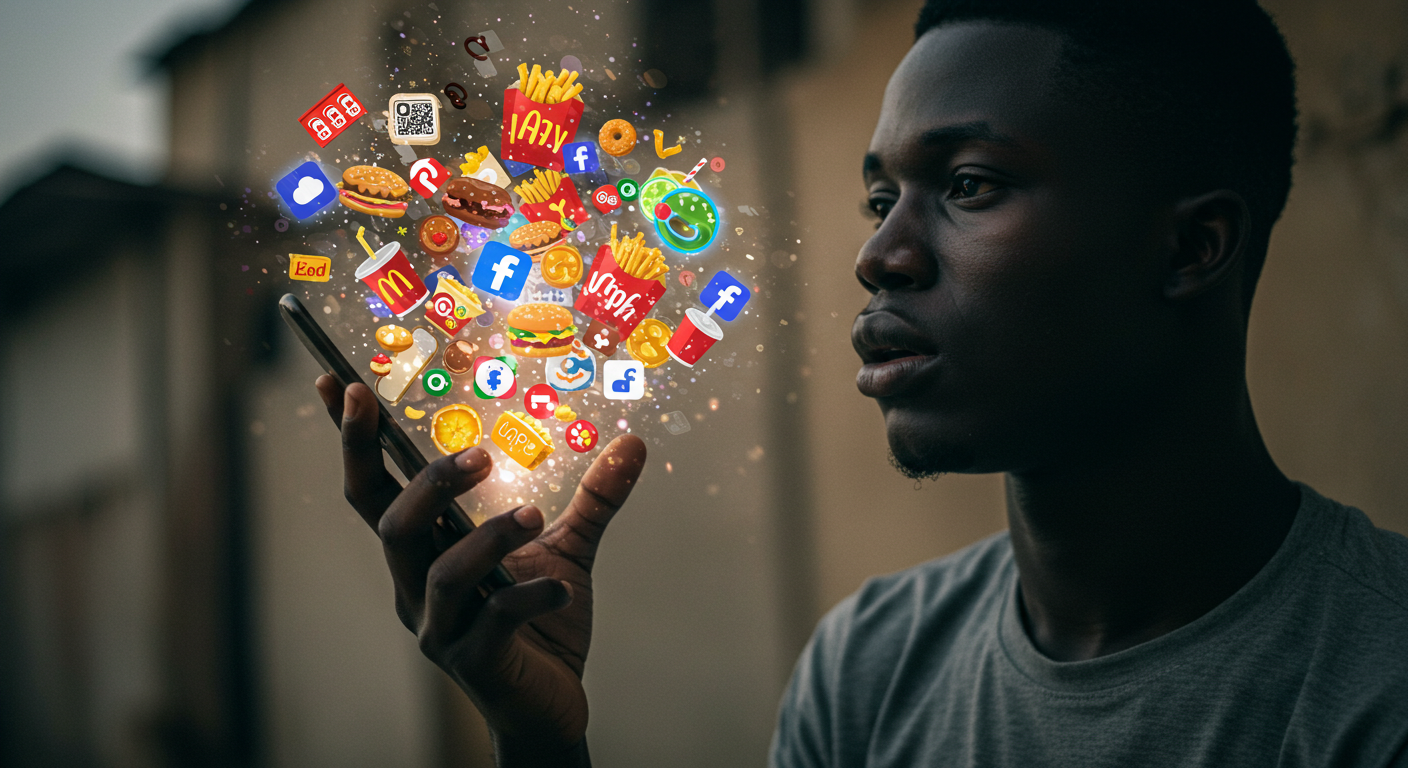In Nigeria, young people are spending more time online than ever. TikTok, Instagram, and YouTube have become the heartbeats of youth culture, shaping what young Nigerians desire, purchase, and consume.
However, a growing concern is emerging. More than half of young people reported seeing junk food advertising online in the last month, with influencer-led posts proving to be the most persuasive.
This trend is not a passing fad. It signals a cultural shift that could shape Nigeria’s future health outcomes. At the center of it all is marketing: clever, aggressive, and largely unchecked in the digital space.
Nigeria’s Perfect Storm for Junk Food Marketing
Nigeria is the largest social media market in Africa, and its young people are mobile-first digital natives. For many of them, the phone screen is the first and last touchpoint of the day. This means the marketing they encounter online is not background noise; it is a constant influence, woven into comedy skits, dance challenges, music videos, and daily influencer content.
Three factors make Nigeria particularly vulnerable:
- Mobile-First Nation: With cheap data packages and affordable handsets, young Nigerians live online. Their “digital diet” is often as critical as their physical diet.
- The Cultural Cool Factor: Influencers present junk food as more than just food. A burger or a bottle of Coke becomes a badge of enjoyment, prestige, and lifestyle—a prop in a wider narrative of belonging and coolness.
- The Regulation Gap: While many other countries are tightening restrictions on unhealthy food marketing to minors, Nigeria’s online advertising standards remain far behind.
The result is clear: young Nigerians are constantly exposed to messages that normalize junk eating as part of everyday life.
Why Influencer-Led Marketing Hits Harder
Traditional advertising is simple to recognize and avoid. Influencer-led marketing, on the other hand, is subtle but effective.
When a comedian incorporates a snack into a joke or a lifestyle influencer casually displays a fast-food meal during a vlog, it doesn’t seem like advertising. It seems genuine, relevant, and trustworthy. This is what makes it so effective.
For Nigerian youth, who perceive influencers as peers rather than superstars, the distinction between entertainment and advertising is almost undetectable. Because most of this information spreads virally, exposure multiplies, transforming a single post into millions of impressions in a few days.
This is not an accident. Marketers understand that the influence economy is one of the most efficient methods to connect with young people. The problem is not the ingenuity of the advertisements, but the health consequences of what they promote.
The Hidden Costs
On the surface, junk food marketing seems harmless—just another meme, laugh, or share. But the hidden costs are real, and they are increasing:
- Public Health Concerns: In Nigeria, childhood obesity, diabetes, and hypertension are already on the rise. Early exposure to bad eating habits heightens these hazards.
- Behavioral Shaping: Marketing sells habits, not just items. If young individuals equate junk food with enjoyment, companionship, or success, these habits may persist for a lifetime.
- Economic Burden: Long-term health difficulties associated with poor nutrition impose a cost on society, families, and the healthcare system.
The debate is whether marketing should continue to push unhealthy consumption, particularly among Nigeria’s impressionable youth.
What Needs to Change
As marketing professionals, we know that the answer is not to stop marketing, but to make it better. Nigeria can learn from what other countries have done while also making its own plans. Four things stand out:
- Smarter Government Rules: Advertising rules need to change to fit the way people live in the digital world. To keep kids safe online, there should be clear guidelines about how junk food can be advertised on sites where kids hang out.
- Brand Responsibility: Brands operating in Nigeria need to be aware of how they affect the culture of young people. Being responsible doesn’t mean giving up on marketing; it means finding a balance between making money and doing good. Promoting healthy choices or stopping the normalization of junk food could make a big difference.
- Influencer Accountability: Creators have a lot of power. They can choose to be open about sales and, more importantly, they can pick the products they promote. It’s a matter of long-term trust for people who see themselves as role models.
- Creative Alternatives: Some of the world’s smartest marketers are in Nigeria. Imagine if the same energy used to promote junk food were used to promote healthy foods and lifestyles as desirable. There is a chance to change the story, from music-based ads to culturally rooted narratives.
From Influence to Responsibility
It’s no accident that junk food ads are becoming more popular among young people in Nigeria. It’s because smart tactics are meeting a digital-first culture. That power comes with a duty, though.
People who work in marketing often praise creativity and impact without asking the more important question: What are we teaching the next generation?
Putting a stop to selling is not the answer. Use marketing’s power to encourage people to make better decisions, build stronger futures, and run businesses in a way that doesn’t harm the environment. We can use the same tools that sell soda and fried snacks to sell healthy food, exercise, and better ways of living.
The Bigger Picture
Even though Nigeria has its own problems, this is a trend that can be seen around the world. From London to Lagos, New York to Nairobi, and everywhere in between, young people are seeing more junk food ads online than ever before. The only difference is that in places like the UK, laws are being made to stop it. Nigeria has a chance to protect its young people before the problem gets worse.
The Future Is on Our Screens
Nigeria’s young are its greatest asset. They are creative, connected, and ambitious. However, their screens are becoming inundated with commercial messages that steer them toward harmful choices.
If nothing changes, the consequences will last for decades, affecting health, productivity, and society. However, by working together, corporations, influencers, and politicians may rethink marketing as a driver of health rather than damage.
The issue isn’t whether marketing will impact Nigeria’s youth—it already has. The issue is, what type of future will influence that shape?
WATCH MARKETING EDGE ONTV






Comment
No comments found.